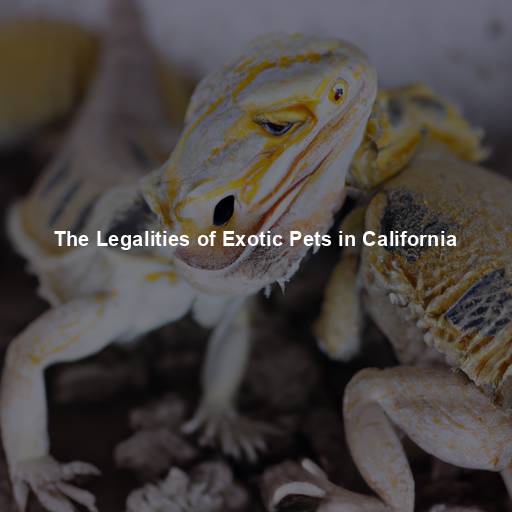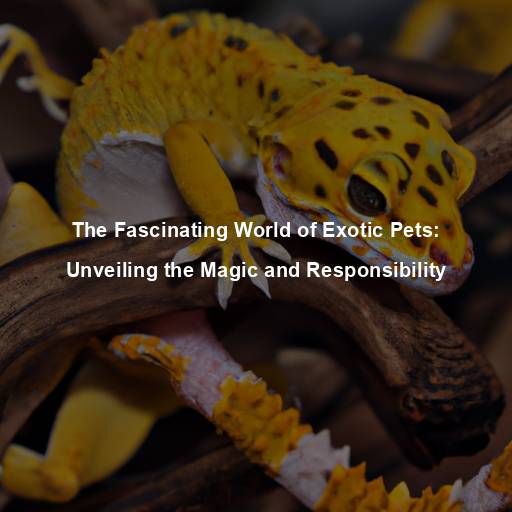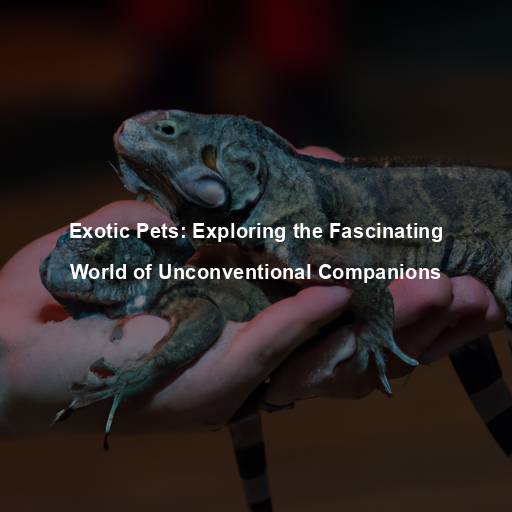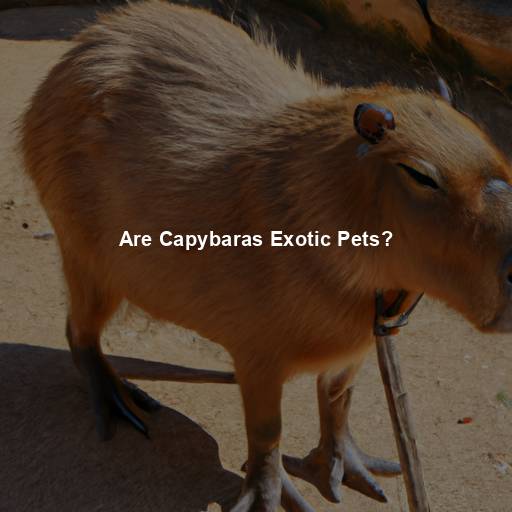What Exotic Pets Are Legal in Massachusetts?
Last Updated on October 31, 2023 by Evan
Contents [hide]
- 1 Understanding Massachusetts’ Exotic Pet Laws
- 2 Navigating Exotic Pet Laws in Massachusetts
- 2.1 The Massachusetts Exotic Pet Law
- 2.2 Domesticated Animals vs. Wild Animals
- 2.3 Restricted Species and Permits
- 2.4 Restricted Species Permit Application
- 2.5 Exotic Pets That Are Legal in Massachusetts
- 2.6 Responsible Exotic Pet Ownership
- 2.7 The Importance of Education and Awareness
- 2.8 The Allure of Exotic Pets
- 2.9 The Bond Between Exotic Pets and Owners
- 2.10 Educational Opportunities
- 2.11 Challenges of Exotic Pet Ownership
- 2.12 Promoting Ethical Practices and Conservation
- 2.13 Public Safety Concerns
- 2.14 Preventing Invasive Species
- 2.15 Potential Risks to Public Health
- 2.16 Bite and Injury Risks
- 2.17 The Role of MassWildlife
- 2.18 Permit Application Process
- 2.19 Evaluation of Applications
- 3 Promoting Responsible Exotic Pet Ownership
- 4 FAQs – What Exotic Pets are Legal in Massachusetts?
- 4.1 What laws regulate owning exotic pets in Massachusetts?
- 4.2 What is considered an exotic pet in Massachusetts?
- 4.3 Are there any exotic pets that are banned in Massachusetts?
- 4.4 Can I keep reptiles as pets in Massachusetts?
- 4.5 Are there any restrictions on owning birds as pets in Massachusetts?
- 4.6 Can I own small mammals, such as hedgehogs or sugar gliders, in Massachusetts?
- 4.7 Are there any restrictions on owning exotic fish in Massachusetts?
- 4.8 Can I legally own a wolf or wolf hybrid as a pet in Massachusetts?
- 4.9 Where can I find more information about owning exotic pets in Massachusetts?
Understanding Massachusetts’ Exotic Pet Laws
Travel deep into the heart of Massachusetts, a land teeming with tales of yore, where nature’s splendor dances with abounding life. But lo and behold, when the topic turns to exotic pets, a maze of laws and regulations emerges, like an enigma wrapped in a riddle. Fear not, dear reader, for enlightenment awaits you. In this informative piece, we shall journey through the intricate web of exotic pet ownership regulations in the Commonwealth of Massachusetts, casting light upon the wondrous creatures that may grace your humble abode.
The Massachusetts Exotic Pet Law
Massachusetts, like many other states, has a set of regulations in place when it comes to owning exotic pets. These laws, found in the Massachusetts General Laws Chapter 131, Section 23, are aimed at various important objectives. They not only prioritize the well-being of both humans and animals, but also work towards preventing the proliferation of invasive species. The categorization of animals into domesticated and wild groups helps to provide clarity and guidelines for pet ownership in the state.
Domesticated Animals vs. Wild Animals
In the land of Massachusetts, the law takes a curious interest in the distinction between our beloved domesticated creatures and their wild counterparts. Domesticated animals, oh how they have been molded through the hands of human intervention, bred skillfully in the captivity of generations. Think dogs wagging their tails, cats purring in cozy corners, rabbits hopping in magical gardens, and guinea pigs squeaking with adorable charm. But the wild ones, oh they dance to a different rhythm!
Restricted Species and Permits
In the beautiful state of Massachusetts, certain remarkable species bear the label of “restricted,” indicating their potential to create a stir or cause untoward disruptions. These captivating creatures, with their allure and uniqueness, demand a special permit from the esteemed Massachusetts Division of Fisheries and Wildlife (MassWildlife) before they may find a cozy home in the hands of an enthusiastic owner. The discerning gaze of the agency diligently scrutinizes each applicant, treading cautiously to ascertain the well-being of the animal and the competence of the prospective pet parent in nurturing and providing a secure haven for their intriguing companion.
Restricted Species Permit Application
To apply for a restricted species permit, prospective owners must provide detailed information about the animal they wish to own, including its species, source, and intended purpose. They must also demonstrate their knowledge of the specific needs and requirements of the animal, as well as their ability to provide proper care and housing.
Exotic Pets That Are Legal in Massachusetts
While Massachusetts has strict regulations on exotic pet ownership, there are still several species that are legal to own with the appropriate permits. Some of the exotic pets that are legal in Massachusetts include:
Owning a feathered companion has its charm, but the world of bird ownership can be quite puzzling. While it’s a delightful truth that parakeets, canaries, and finches can bring joy to your home without any governmental hoops to jump through, one must tread cautiously when it comes to the more delicate avian treasures. Sadly, endangered or protected bird species remain off-limits, leaving us in awe of their beauty from a respectful distance.
Discover the captivating world of reptiles and amphibians in Massachusetts, where a multitude of species awaits passionate pet owners. From the mesmerizing ball pythons to the radiant corn snakes, and the majestic bearded dragons to the enchanting turtles and frogs, there’s a diverse range of companions to choose from. It’s important to note that while Massachusetts embraces these scaly and slimy marvels, it does enforce a ban on venomous reptiles, ensuring the safety and tranquility of both owners and the surrounding community.
Curious creatures of all shapes and sizes have captured the hearts of many animal lovers. In the realm of small mammals, a delightful array of furry companions awaits those seeking whimsical company. The charming likes of hamsters, gerbils, rabbits, and guinea pigs dance freely through our lives, bringing joy without the need for official documents. However, as we venture into the realm of larger mammals, a labyrinth of regulations reveals itself, with primates, raccoons, and ferrets demanding a special invitation in the form of a permit.
Owning fish can be an exciting and rewarding experience, especially when it comes to the vast array of tropical fish that can grace our home aquariums. Thankfully, there are no permits needed for most fish species, making it easier for enthusiasts to dive into this delightful hobby. However, it’s crucial to be aware of certain exceptions, as some fish species may pose a threat to our fragile ecosystems or may be protected due to their endangered status. In such cases, it’s important to abide by the regulations put in place to ensure the preservation of our underwater world.
When it comes to owning exotic pets, the list of considerations is far from complete. It’s crucial to stay informed and seek guidance from the Massachusetts Division of Fisheries and Wildlife to fully comprehend and adhere to prevailing regulations. The complex world of exotic pet ownership demands careful navigation to ensure legality and responsible decisions.
Responsible Exotic Pet Ownership
Owning an exotic pet comes with great responsibility. Before bringing an exotic pet into your home, it is essential to thoroughly research the species and understand its specific care requirements. Exotic pets often have unique dietary needs, specialized enclosures, and require expert handling. It’s crucial to provide a suitable environment that mimics their natural habitat and promotes their overall well-being.
The Importance of Education and Awareness
Massachusetts takes a stand against the wild and wacky world of exotic pets, setting rules that safeguard both the critters and the curious residents. These laws aim to keep invasive species at bay, ward off any imminent danger to the public, and ensure the well-being of these unconventional companions. Cultivating knowledge and raising awareness emerge as key players in taming these untamed creatures, creating an atmosphere where flaunting your flamboyant friends can be done responsibly and in perfect harmony.
The Allure of Exotic Pets
There is something undeniably mesmerizing about exotic pets. Their otherworldly allure, manifested in their distinctive features and enigmatic ways, manages to capture our imaginations in ways we can scarcely comprehend. Who can resist the pull of owning a companion that defies convention, a creature that challenges the conventional notions of domestication? Exotic pets beckon us into an extraordinary realm, inviting us to embark on a unique journey of discovery, where we can forge an unparalleled bond with the vast tapestry of life on this planet.
The Bond Between Exotic Pets and Owners
Just like traditional pets, exotic animals can form strong bonds with their owners. Through regular interaction and proper care, a deep connection can develop between humans and their exotic companions. This bond can bring immense joy, companionship, and a sense of fulfillment to the owner’s life. Exotic pets often exhibit unique personalities and behaviors, allowing owners to witness fascinating aspects of their natural instincts.
Educational Opportunities
Owning an exotic pet can be a valuable educational experience, especially for families with children. It offers the chance to learn about different species, their habitats, and specific care requirements. By actively participating in the care and well-being of an exotic pet, individuals can gain a deeper understanding of the animal kingdom and develop a sense of responsibility towards the environment.
Challenges of Exotic Pet Ownership
Owning an exotic pet offers a truly unique and awe-inspiring experience, but let’s not overlook the bursts of reality and perplexing moments that can accompany this endeavor. Delving into the world of exotic animals demands a careful evaluation of the multifaceted challenges that lie ahead. From the demanding care requirements to the complex legal aspects, it is imperative to embrace the myriad of factors that could potentially disrupt the harmony between you and your exotic companion. Nonetheless, with proper research, commitment, and a solid support system, the journey of owning an exotic pet can be an adventure like no other.
Specialized Care Requirements
Owning an exotic pet can be a fascinating and rewarding adventure. However, it’s important to acknowledge that these captivating creatures often come with a bewildering range of needs that demand meticulous care and dedicated attention. From meticulously maintaining optimal temperature and humidity levels to tailoring their diet to precise specifications, catering to the well-being of these unique pets can become quite the intricate puzzle. Consequently, it is vital to conduct thorough research and develop a comprehensive understanding of the specific care requirements of the species you wish to welcome into your home, to guarantee their flourishing health and genuine happiness.
Legal Restrictions and Permits
As discussed earlier, owning an exotic pet in Massachusetts requires adherence to strict regulations and obtaining the necessary permits. These legal restrictions are in place to protect both the animals and the public. It’s crucial to familiarize yourself with the laws surrounding exotic pet ownership and ensure compliance to avoid legal consequences.
Financial Considerations
Owning an exotic pet is no small feat, as it comes with a hefty price tag. From the moment you bring these extraordinary creatures into your life, they demand constant care and attention that can make your wallet cringe. Beyond the initial investment, there’s a never-ending list of expenses awaiting you: the gourmet meals, the luxurious habitats, the exclusive trips to the vet, and the fancy gadgets and gizmos they require. Before diving headfirst into the exotic pet realm, it’s crucial to take a hard look at your bank account and ensure that it can withstand the financial whirlwind these curious creatures bring with them.
Time and Commitment
Taking care of an exotic pet can be quite a perplexing and time-consuming endeavor. These extraordinary creatures often live for a long time, so you’ll need to commit to providing them with sustained care and constant engagement. Before embarking on this adventure, it’s essential to carefully evaluate your lifestyle and determine whether you have the necessary time and energy to meet the demanding requirements of responsible exotic pet ownership.
Limited Availability of Veterinary Care
Discovering a veterinarian who possesses the expertise to care for exotic creatures can be quite the hunt, particularly in certain locales. Extraordinary pets often demand tailored veterinary attention from skilled practitioners well-versed in addressing their idiosyncratic health challenges. Prioritizing the identification of a competent veterinarian in your vicinity is an absolute prerequisite before welcoming an extraordinary companion into your abode.
Promoting Ethical Practices and Conservation
It is important to remember that many exotic pets are sourced from the wild, and their capture and trade can have detrimental effects on their populations and habitats. As responsible pet owners, it is our duty to promote ethical practices and support conservation efforts. Whenever possible, consider adopting an exotic pet from a reputable rescue or rehabilitation center rather than contributing to the demand for wild-caught animals.
Public Safety Concerns
When delving into the realm of exotic pet ownership, caution and diligence become the steadfast companions. The enigmatic allure of peculiar creatures is matched only by the potential perils they might present if not tamed with care. In the radiant landscape of Massachusetts, where regulations dance like gossamer threads, an unyielding effort is made to safeguard both the curious bipeds and the fragile ecosystem that weaves through our collective consciousness. Through comprehensive measures and astute oversight, the safety of the public remains a beacon of utmost importance, guiding us through the enchanting labyrinth of exotic pet ownership.
Preventing Invasive Species
The importance of regulating exotic pets cannot be overstated, as it serves as a vital safeguard against the potential havoc that invasive species can wreak upon local ecosystems. Invasive species, comprising non-native plants and animals, pose a triple threat, endangering the delicate balance of the environment, economic stability, and even human well-being. The proactive efforts of Massachusetts to restrict the ownership of specific exotic species are commendable, serving as a formidable shield to preserve and protect its unparalleled ecosystems from potential harm.
Potential Risks to Public Health
Did you know that cuddly, exotic animals could actually be harboring some alarming diseases? Yes, that’s right! These diseases, ominously termed as zoonotic diseases, have the potential to wreak havoc on human health. Massachusetts, in a stroke of cautionary brilliance, has taken the bold step of regulating the ownership of exotic pets to safeguard its residents from the treacherous web of potential disease transmission.
Bite and Injury Risks
The world of exotic animals can be a wild and untamed one, full of unpredictability and the unknown. These creatures, not bound by the familiar comforts of domestication, carry with them a sense of adventure and danger. It is in the realm of larger and mightier species where the risks rise, as their untamed instincts can lead to unexpected bites and injuries. To safeguard against these perils and ensure public safety, Massachusetts has taken the initiative to introduce regulations on the ownership of exotic pets.
The Role of MassWildlife
The Massachusetts Division of Fisheries and Wildlife (MassWildlife) plays a crucial role in regulating exotic pet ownership in the state. MassWildlife is responsible for evaluating permit applications and ensuring that the welfare of the animals and the safety of the public are upheld.
Permit Application Process
Owning a restricted species in Massachusetts is no walk in the park, my friends. You’ve got to navigate through a gnarly permit application process that’s more complicated than a Rubik’s cube. They want all the nitty-gritty details on the exotic pet you’ve got your eye on – the species, where you’re planning to get it from, and why on earth you want it in the first place. But that’s not all.
Evaluation of Applications
At MassWildlife, there’s an intricate evaluation process for permit applications to strike a balance between exotic pet ownership and adhering to state regulations. Factors such as the applicant’s expertise, proposed housing arrangements, and potential threats to public safety and the environment all come under scrutiny. By carefully considering these elements, the agency strives to promote responsible exotic pet ownership while minimizing any potential risks that may arise.
Promoting Responsible Exotic Pet Ownership
Education and Awareness Campaigns
Ensuring a harmonious coexistence between the enchantment of exotic pets and the imperatives of safeguarding public safety and animal welfare remains paramount in today’s society. By fostering a culture of education and raising awareness, we empower individuals to arm themselves with the information and tools necessary to navigate the intricacies of exotic pet ownership with discernment and responsibility. The equilibrium between bliss and prudence is within our grasp, as we embrace the transformative power of knowledge and the crucial role played by awareness campaigns in shaping our choices.
Providing Resources and Support
For those captivated by the allure of exotic pets, a myriad of avenues awaits to guide and fortify their passion. Esteemed government agencies, tireless animal welfare organizations, and vibrant pet enthusiast communities stand ready to unfold an extensive tapestry of resources and support. Within this realm of boundless fascination, one may find carefully crafted care guides, invaluable local regulations, connections to seasoned veterinarians, and a vibrant community fostering the exchange of wisdom and experience.
Encouraging Adoption and Rescue
Choosing to bring an unconventional companion into your life can be an ethically sound decision that not only enriches your own existence but also brings hope and solace to animals who have endured difficult circumstances. By aligning yourself with reputable rescue and rehabilitation centers, you pave the way for a more compassionate and sustainable future, where the demand for wild-caught animals diminishes, and their well-being takes precedence. Embracing the beauty of diversity, through adoption, lets us embrace a burst of purpose and perplexity that can transform the lives of both humans and exotic creatures alike.
Reporting Violations
In order to really crack down on the regulations surrounding exotic pets, it’s absolutely crucial for folks in the community to step up and report any suspicious activities they stumble upon. If you’ve got a hunch that your neighbor might be harboring a lion in their backyard, or even worse, neglecting the needs of these unique creatures, it’s important to reach out to the right people to address the issue head-on. By doing so, not only are you safeguarding the well-being of these extraordinary animals, but you’re also ensuring the overall safety of your neighborhood and those who call it home.
FAQs – What Exotic Pets are Legal in Massachusetts?
What laws regulate owning exotic pets in Massachusetts?
Ever wondered about the intriguing world of exotic pets? Well, when it comes to Massachusetts, they’ve got a whole set of laws and regulations to keep things in check. These regulations aren’t just there for show – they’re all about making sure that the animals and the public stay safe and sound. So, buckle up, because we’re about to explore the wild side of pet ownership in the Bay State!
What is considered an exotic pet in Massachusetts?
When it comes to pets in Massachusetts, the definition of exotic takes a walk on the wild side. We’re talking about animals that break the mold of your typical domestic companion. Think slithery reptiles, hopping amphibians, colorful birds, tiny mammals, and even some out-of-this-world fish. These quirky critters might not be your everyday cuddle buddies, but they sure do add a burst of excitement to the Bay State!
Are there any exotic pets that are banned in Massachusetts?
It’s quite a convoluted state of affairs in Massachusetts when it comes to owning unique and exotic pets. Brace yourself for the murky regulations and bewildering list of forbidden creatures. Strutting in the prohibited line-up, you’ll find alligators and crocodiles, along with their slithery counterparts, venomous snakes. Primates, with the exception of capuchins, are also off-limits, as are majestic and powerful felines like lions and tigers. Talk about a jungle of restrictions!
Can I keep reptiles as pets in Massachusetts?
Keeping reptiles as pets in Massachusetts is usually allowed; however, there’s a catch. Certain species are prohibited, so it’s crucial to make sure your scaly friend doesn’t fall into that category. But wait, there’s more! Brace yourself for potential paperwork and permits, as some reptiles may require special authorizations due to their potential danger to public safety. So, before you slither into reptile ownership, tread carefully and ensure you’re on the right side of the law.
Are there any restrictions on owning birds as pets in Massachusetts?
Owning most species of birds is generally allowed in Massachusetts, as long as they are not specifically prohibited or protected under state or federal law. However, it is a good practice to research any specific licensing requirements or regulations that may be applicable to the particular bird species you are interested in keeping as a pet.
Can I own small mammals, such as hedgehogs or sugar gliders, in Massachusetts?
Owning quirky and adorable small mammals like hedgehogs or sugar gliders in Massachusetts is totally legal! However, hold your tiny paws for a moment, as certain towns and cities in the state might have their own set of rules and regulations when it comes to these furry friends. So, before you rush out to bring one of these cuties home, it’s always wise to double-check with the local authorities to avoid any unexpected surprises.
Are there any restrictions on owning exotic fish in Massachusetts?
Generally, there are no specific restrictions on owning exotic fish in Massachusetts. However, it is vital to ensure that these fish species are not listed as invasive or prohibited by the state’s Department of Fish and Game. Some exotic fish may require permits or specific care guidelines to prevent them from adversely affecting the local ecosystem if they were to accidentally escape or be released.
Can I legally own a wolf or wolf hybrid as a pet in Massachusetts?
In the beautifully diverse state of Massachusetts, there are certain regulations in place to ensure the safety and well-being of both the public and our beloved furry friends. One such regulation pertains to the ownership of wolves or wolf hybrids, as these majestic creatures are deemed wild and potentially hazardous. It is therefore crucial for residents to select pets that abide by the guidelines and are suitable for the residential settings within the state. Let us embark on a journey to discover the wonderful array of companion animals that are warmly welcomed in the arms of Massachusetts homeowners.
Where can I find more information about owning exotic pets in Massachusetts?
For more detailed and up-to-date information about owning exotic pets in Massachusetts, it is recommended to consult the official website of the Massachusetts Division of Fisheries and Wildlife, as well as local authorities or animal control departments in your specific area. They will be able to provide specific guidelines and restrictions related to owning exotic pets based on your location within the state.







